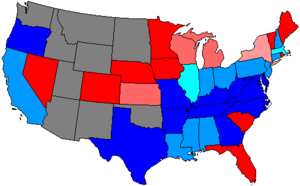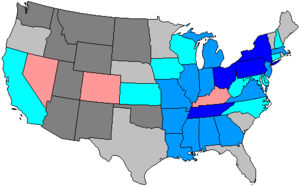
United States House election, 1874
Encyclopedia
The U.S. House election, 1874 was an election for the United States House of Representatives
in 1874, which occurred in the middle of President Ulysses S. Grant
's second term. It was an important turning point, as the Republicans lost heavily and the Democrats gained control of the House. It signaled the imminent end of Reconstruction, which Democrats opposed.
With the election following the Panic of 1873
, Grant's Republican Party
was crushed in the elections, losing their majority and almost half their seats to the Democratic Party
. This was the first period of Democratic control following the Civil War. The economic crisis and the inability of Grant to find a solution lead the his party's defeat.
In the south, the Democrats and Conservatives continued their systematic construction of the Republican coalition. In the South, Scalawags moved into the Democratic Party. The Democratic landslide signaled the imminent end of Reconstruction, which Democrats opposed and a realignment of the Republican coalition that had dominated American politics since the late 1850s..
As Rhodes [7:131-3] explains:
United States House of Representatives
The United States House of Representatives is one of the two Houses of the United States Congress, the bicameral legislature which also includes the Senate.The composition and powers of the House are established in Article One of the Constitution...
in 1874, which occurred in the middle of President Ulysses S. Grant
Ulysses S. Grant
Ulysses S. Grant was the 18th President of the United States as well as military commander during the Civil War and post-war Reconstruction periods. Under Grant's command, the Union Army defeated the Confederate military and ended the Confederate States of America...
's second term. It was an important turning point, as the Republicans lost heavily and the Democrats gained control of the House. It signaled the imminent end of Reconstruction, which Democrats opposed.
With the election following the Panic of 1873
Panic of 1873
The Panic of 1873 triggered a severe international economic depression in both Europe and the United States that lasted until 1879, and even longer in some countries. The depression was known as the Great Depression until the 1930s, but is now known as the Long Depression...
, Grant's Republican Party
History of the United States Republican Party
The United States Republican Party is the second oldest currently existing political party in the United States after its great rival, the Democratic Party. It emerged in 1854 to combat the Kansas Nebraska Act which threatened to extend slavery into the territories, and to promote more vigorous...
was crushed in the elections, losing their majority and almost half their seats to the Democratic Party
History of the United States Democratic Party
The history of the Democratic Party of the United States is an account of the oldest political party in the United States and arguably the oldest democratic party in the world....
. This was the first period of Democratic control following the Civil War. The economic crisis and the inability of Grant to find a solution lead the his party's defeat.
In the south, the Democrats and Conservatives continued their systematic construction of the Republican coalition. In the South, Scalawags moved into the Democratic Party. The Democratic landslide signaled the imminent end of Reconstruction, which Democrats opposed and a realignment of the Republican coalition that had dominated American politics since the late 1850s..
As Rhodes [7:131-3] explains:
- In the fall elections of 1874 the issue was clearly defined: Did the Republican President Ulysses S. GrantUlysses S. GrantUlysses S. Grant was the 18th President of the United States as well as military commander during the Civil War and post-war Reconstruction periods. Under Grant's command, the Union Army defeated the Confederate military and ended the Confederate States of America...
and Congress deserve the confidence of the country? and the answer was unmistakably No, although the early contests in Vermont and Maine gave little indication of it. Even James G. BlaineJames G. BlaineJames Gillespie Blaine was a U.S. Representative, Speaker of the United States House of Representatives, U.S. Senator from Maine, two-time Secretary of State...
, an acute judge of popular sentiment, failed in his forecast and, as he traveled through the West, gave his hearers to understand that the next House was certain to be Republican and himself its Speaker. Those who may have been inclined to doubts were encouraged by the revival of the song of 1840 "Oh! have you heard the news from Maine?" and the Republicans of Ohio and Indiana went to the polls on their October election day with a certain confidence of success. But the Democrats carried both these States and made notable gains in members of Congress. In November, they elected Samuel J. TildenSamuel J. TildenSamuel Jones Tilden was the Democratic candidate for the U.S. presidency in the disputed election of 1876, one of the most controversial American elections of the 19th century. He was the 25th Governor of New York...
governor of New York by 50,000 majority and William Gaston governor of Massachusetts by 7000 and also carried Pennsylvania.
- The Democrats had won a signal victory, obtaining control of the next House of Representatives which would stand Democrats 168, Liberals and Independents 14, Republicans 108 as against the two-thirds Republican majority secured by the election of 1872. Since 1861 the Republicans had controlled the House and now with its loss came a decrease in their majority in the Senate....
- The political revolution from 1872 to 1874 was due to the failure of the Southern policy of the Republican party, to the Credit MobilierCrédit Mobilier of America scandalThe Crédit Mobilier scandal of 1872 involved the Union Pacific Railroad and the Crédit Mobilier of America construction company in the building of the First Transcontinental Railroad. The distribution of Crédit Mobilier shares of stock by Congressman Oakes Ames along with cash bribes to...
and Sanborn contract scandalSanborn IncidentThe Sanborn incident or Sanborn contract was an American political scandal which occurred in 1874.William Adams Richardson, Ulysses S. Grant’s Secretary of the Treasury, hired a private citizen, John D. Sanborn, to collect $427,000 in unpaid taxes. Richardson agreed Sanborn could keep half of what...
s, to corrupt and inefficient administration in many departments and to the persistent advocacy of Grant by some close friends and hangers-on for a third presidential term. Some among the opposition were influenced by the President's backsliding in the cause of civil service reform, and others by the failure of the Republican party to grapple successfully with the financial question. The depression, following the financial Panic of 1873Panic of 1873The Panic of 1873 triggered a severe international economic depression in both Europe and the United States that lasted until 1879, and even longer in some countries. The depression was known as the Great Depression until the 1930s, but is now known as the Long Depression...
, and the number of men consequently out of employment weighed in the scale against the party in power. In Ohio, the result was affected by the temperance crusadeTemperance movementA temperance movement is a social movement urging reduced use of alcoholic beverages. Temperance movements may criticize excessive alcohol use, promote complete abstinence , or pressure the government to enact anti-alcohol legislation or complete prohibition of alcohol.-Temperance movement by...
in the early part of the year. Bands of women of good social standing marched to saloons before which or in which they sang hymns and, kneeling down, prayed that the great evil of drink might be removed. Sympathizing men wrought with them in causing the strict law of the State against the sale of strong liquor to be rigidly enforced. Since Republicans were in the main the instigators of the movement, it alienated from their party a large portion of the German AmericanGerman AmericanGerman Americans are citizens of the United States of German ancestry and comprise about 51 million people, or 17% of the U.S. population, the country's largest self-reported ancestral group...
vote.
Overall results
| Party | Total seats (change) | Seat percentage | |
|---|---|---|---|
| Democratic Party | 182 | +94 | 62.1% |
| Republican Party | 103 | -96 | 35.1% |
| Independent Independent (politician) In politics, an independent or non-party politician is an individual not affiliated to any political party. Independents may hold a centrist viewpoint between those of major political parties, a viewpoint more extreme than any major party, or they may have a viewpoint based on issues that they do... |
8 | +3 | 2.7% |
| Totals | 293 | +1 | 100.0% |
 |
 |
California
| District | Incumbent | Party | Elected | Results | Candidates |
|---|---|---|---|---|---|
| Charles Clayton Charles Clayton Charles Clayton was a United States Representative from California. He was born in Derbyshire, England. He was the Alcalde of Santa Clara, California from 1849-1850. He was a miller and founded the Santa Clara flour mills.... |
Republican | |
Retired Democratic gain |
William Adam Piper William Adam Piper William Adam Piper was an American politician and a member of the United States House of Representatives from California.-Life:... (D) 49.1% Ira P. Rankin (R) 26.8% John F. Swift (I) 24.1% |
|
| Horace F. Page Horace F. Page Horace Francis Page was an American politician that represented a Californian district in the United States House of Representatives. He was born near Medina, Orleans County, New York. He attended public schools and Millville Academy and then taught school in La Porte County, Indiana until 1854... |
Republican | |
Re-elected | Horace F. Page Horace F. Page Horace Francis Page was an American politician that represented a Californian district in the United States House of Representatives. He was born near Medina, Orleans County, New York. He attended public schools and Millville Academy and then taught school in La Porte County, Indiana until 1854... (R) 43.4% Henry Larkin (D) 38.7% Charles A. Tuttle (I) 17.8% |
|
| John K. Luttrell John K. Luttrell John King Luttrell was a U.S. Representative from California.Born near Knoxville, Tennessee, Luttrell attended the common schools. He moved with his parents to a farm in Alabama in 1844. He moved to Missouri in 1845 with his parents, who settled on a farm near St. Joseph. He moved to California in... |
Democratic | |
Re-elected | John K. Luttrell John K. Luttrell John King Luttrell was a U.S. Representative from California.Born near Knoxville, Tennessee, Luttrell attended the common schools. He moved with his parents to a farm in Alabama in 1844. He moved to Missouri in 1845 with his parents, who settled on a farm near St. Joseph. He moved to California in... (D) 46.7% C. B. Denio (R) 36.1% Charles F. Reed (I) 17.1% |
|
| Sherman O. Houghton | Republican | |
Lost re-election Democratic gain |
Peter D. Wigginton Peter D. Wigginton Peter Dinwiddie Wigginton was a U.S. Representative from California.Born in Springfield, Illinois, Wigginton moved to Wisconsin with his parents in 1843.... (D) 48.8% Sherman O. Houghton (R) 34.6% J. S. Thompson (I) 16.7% |

